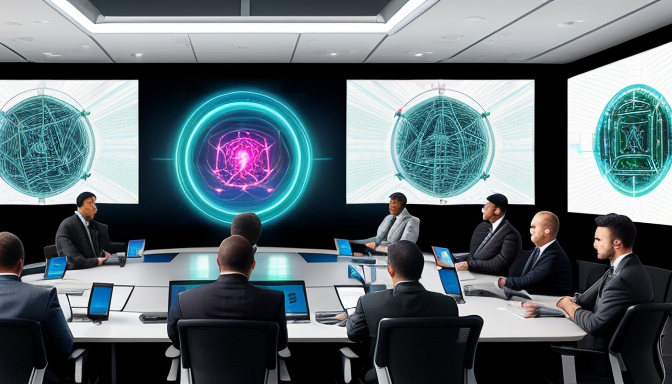The conversation around artificial intelligence (AI) is heating up, and it feels like we’re standing at a crossroads. On one side, we have the optimists, who see AI as a beacon of hope, promising to revolutionize our lives in ways we can’t even imagine. On the other side, the skeptics warn us of the potential doom that could follow if we don’t tread carefully. So, which side is right? Are we on the brink of a technological utopia or a dystopian nightmare?
As we explore this great debate, it’s essential to recognize that AI is not just a buzzword; it’s a powerful tool that can reshape industries, enhance our daily routines, and even save lives. Think about healthcare, for instance. AI algorithms can analyze vast amounts of data to identify diseases earlier than ever before, leading to better patient outcomes. Isn’t that a compelling reason to embrace this technology? Moreover, businesses are leveraging AI to streamline operations, reduce costs, and improve efficiency—creating a ripple effect that benefits the economy and consumers alike.
However, we must also confront the uncomfortable truths surrounding AI. The fear of job displacement looms large, as machines become capable of performing tasks traditionally done by humans. This raises ethical questions: Who is responsible when an AI system makes a mistake? And what happens when autonomous systems make decisions that could harm individuals or society? These concerns are not just hypothetical; they demand our attention and action.
In conclusion, the debate over AI is not merely about its capabilities but also about our responsibility as stewards of this technology. The future is unwritten, and how we navigate these challenges will determine whether AI becomes our greatest ally or our most significant adversary. Are we ready to take on this challenge?
The Promises of AI
Artificial Intelligence (AI) is not just a buzzword; it’s a transformative force that has the potential to revolutionize our world. Imagine a future where healthcare is not only more efficient but also more personalized. With AI, doctors can analyze vast amounts of data to identify patterns and predict health issues before they arise, leading to earlier interventions and better outcomes. This isn’t science fiction; it’s happening now! AI algorithms can process medical images, assist in diagnostics, and even suggest treatment plans tailored to individual patients.
But the wonders of AI don’t stop there. In industries ranging from manufacturing to finance, AI is streamlining operations and boosting productivity. For instance, automated systems can optimize supply chains, manage inventory, and even forecast market trends with impressive accuracy. This means companies can operate more efficiently, reduce costs, and ultimately, pass those savings on to consumers.
Moreover, AI enhances our daily lives in ways we often take for granted. From smart assistants that help us manage our schedules to recommendation systems that suggest our next favorite binge-watch, AI is seamlessly integrating into our routines. It’s like having a personal assistant who knows you better than you know yourself!
As we embrace these advancements, it’s essential to stay informed about the latest developments in AI, machine learning, robotics, and other emerging technologies. The future is bright, but it’s our responsibility to navigate it wisely. So, are you ready to explore the incredible promises of AI?

The Perils of AI
As we dive into the world of artificial intelligence, it’s crucial to recognize that with great power comes great responsibility. While AI holds immense potential, it also brings a host of challenges that we cannot ignore. One of the most pressing concerns is job displacement. Imagine walking into a factory where robots are performing tasks that once required human hands. This shift could lead to significant unemployment rates, leaving many skilled workers in the dust. The question we must ask ourselves is: are we ready to adapt to this new reality?
Moreover, the ethical implications of AI cannot be overlooked. As these systems become more autonomous, who is responsible when things go wrong? Consider a self-driving car that makes a split-second decision that results in an accident. Is it the car manufacturer, the software developer, or the owner? This murky territory raises serious questions about accountability and morality in technology.
Additionally, the risk of autonomous systems making harmful decisions is a chilling reality. The potential for AI to be weaponized or to operate in ways that are detrimental to society is a concern echoed by many experts. It’s not just about the technology itself; it’s about the intentions behind it. We must tread carefully, ensuring that our creations do not spiral out of control.
In conclusion, while AI can indeed transform our lives for the better, we must remain vigilant. The balance between innovation and ethical responsibility is delicate, and it’s up to us to navigate this uncharted territory. Are we prepared to face the perils of AI head-on?
Frequently Asked Questions
- What are the main benefits of AI?
AI can revolutionize various sectors by enhancing efficiency, improving healthcare outcomes, and automating mundane tasks. Imagine a world where doctors can diagnose diseases faster and more accurately, thanks to AI algorithms!
- What risks does AI pose to society?
While AI offers great advantages, it also brings risks like job displacement and ethical dilemmas. Picture a future where machines take over jobs, leaving many people struggling to find work—it’s a scary thought!
- Can AI make decisions independently?
Yes, AI systems can make decisions based on data. However, this raises concerns about accountability and the potential for harmful outcomes. It’s like handing over the keys to a car without knowing if the driver is sober!
- How can we ensure AI is developed responsibly?
To ensure responsible AI development, we need strong regulations, ethical guidelines, and transparency in AI processes. Think of it as putting guardrails on a winding mountain road—safety first!
- Will AI eventually surpass human intelligence?
This is a hot topic! Some experts believe AI could reach or exceed human intelligence, while others argue that human creativity and emotional intelligence are irreplaceable. It’s like comparing apples to oranges—both have their unique strengths!
